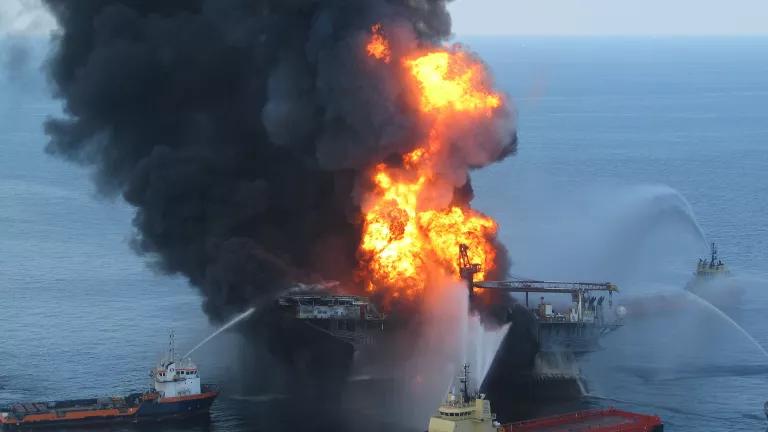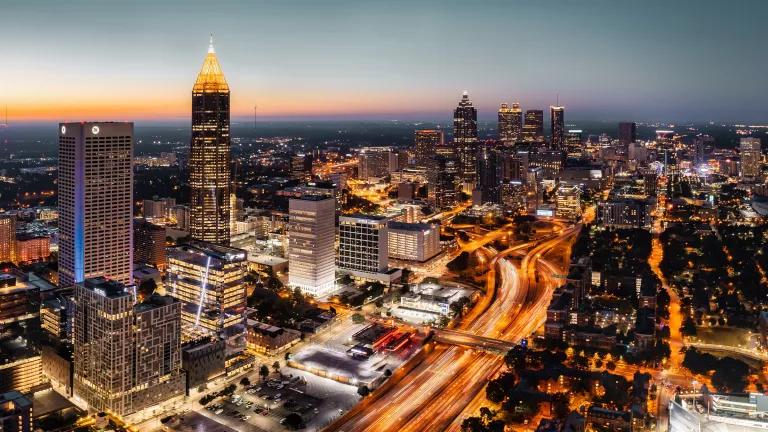Promised Land -- everyone in the fracking world is talking about this new film. Almost as much as people were talking about the new season of Downton Abbey. As my colleague Kate Sinding blogged: "Promised Land" powerfully highlights what's at stake for communities in fracking's path: the Hobson’s choice between speculative economic gain on the one hand and traditional rural/agricultural character and bucolic landscapes on the other--and a community’s right to self-determination. Kate writes more about NRDC's view on these choices and what we are doing about it.
I really enjoyed this film. It is my favorite kind of movie – drama without violence but with smart humor and interesting characters. I'm a fan of all the actors and, needless to say with this cast, the acting was incredibly good. The scenery was beautiful--rural countryside, a small town, barns and farmhouses.
I wasn't prepared for the plot twist at the film's climax, and I won't spoil it for anyone who hasn't seen the film yet, but I found the story thought-provoking and creative (reinforcing my great appreciation for the work of Dave Eggers).
I was eager to see the film for many reasons, one being the criticism that has been lodged at it as being dishonest in some way. To the contrary, I thought the film was very balanced. The screenwriters seemed to want to make the characters working for the oil and gas industry--Matt Damon (Steve) and Frances McDormand (Sue)--come across as well meaning people who cared about their families, with Matt Damon's character determined to help a rural community avoid the poverty that struck his own town. The community members were also well meaning folks wanting to take care of their families and their farms, with some differing views of the best path to accomplish those goals. The teacher seemed to represent the community torn in different directions and struggling with which fork in the road to take.
The film captured the essence of many policy decisions: well meaning people with some shared goals and priorities--and some different ones--end up on opposite sides of the debate. For those of you who are Downton Abbey addicts like I am, it reminded me of the ongoing tension between Matthew and Mary over money, morals, preserving community, family and tradition, and simplicity vs. opulence.
What the film left me wanting was an acknowledgement of the path toward real world solutions that NRDC supports: clean energy and healthy communities through energy efficiency, renewable energy, and sustainable agriculture and development that preserve clean air, clean water, and economic vitality.
What's unrealistic in the film? I don't know of any environmentalists who have been offered bribes or who have used flaming dioramas in school presentations. But this is a Hollywood movie, after all.
What's realistic about fracking: state agencies have documented that drinking water has been contaminated by oil and gas production, farmers have been financially ruined, communities have been drastically changed, and cows have died from fracking operations in Louisiana and Pennsylvania. And communities sometimes do vote; earlier this year, the citizens of Longmont, Colorado voted to ban fracking, but they are being sued by the oil and gas industry, and similar legal struggles to protect local authority occur in other states, as Kate details in her blog.
Additionally, while Steve and Sue seem like well-intentioned landmen, many landowners have felt that landmen who came to their homes were deceptive. For example, a New York Times investigation found that fewer than half of leases examined require companies to compensate landowners for water contamination after drilling begins. And Reuters found that some leases leave the landowner responsible for the unpaid bills of the oil and gas companies. Some landowners see financial gains, but many only see losses of their finances and way of life.
When we leave the movie theater, many of us are reminded that fracking is not just a film topic. There are real victims who are not characters in a movie. We need the strongest possible rules in place to protect the real Americans impacted by water contamination and other consequences of fracking-gone-wrong every day, and communities need to be able to protect themselves. The real solution is for the well-meaning people on all sides of the issues to acknowledge that these are not either/or choices but there are clean and sustainable solutions that can create jobs and preserve the environment, communities, local economies, and tradition--a win-win path. I predict that Mary and Matthew will find their own win-win solution.




